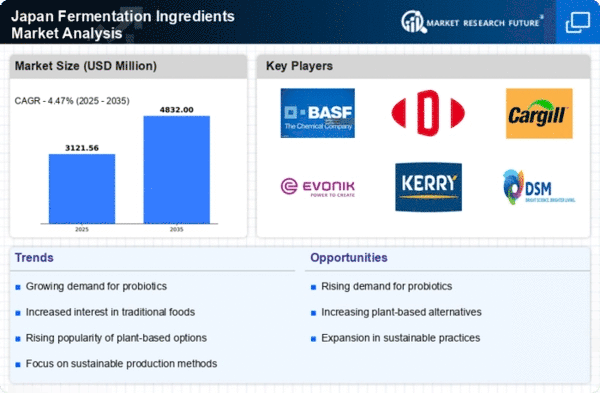Growing Health Consciousness
The increasing awareness of health and wellness among consumers in Japan is driving This market is driving the fermentation ingredients.. As individuals become more health-conscious, they are seeking products that offer functional benefits, such as improved digestion and enhanced immunity. This trend is reflected in the rising demand for probiotic-rich foods and beverages, which are often derived from fermentation processes. According to recent data, the market for probiotic products in Japan is projected to grow at a CAGR of approximately 8% over the next five years. This shift towards healthier lifestyles is likely to encourage manufacturers to innovate and expand their offerings in the fermentation ingredients market, catering to the evolving preferences of Japanese consumers.
Culinary Tradition and Innovation
Japan's rich culinary heritage, which includes fermented foods like miso, soy sauce, and sake, plays a pivotal role in This market is influenced by Japan's rich culinary heritage.. The traditional use of fermentation in Japanese cuisine not only preserves food but also enhances flavors and nutritional value. As culinary innovation continues to thrive, there is a growing interest in incorporating fermentation techniques into modern food products. This fusion of tradition and innovation is likely to attract both local and international consumers, thereby expanding the market. The fermentation ingredients market is expected to benefit from this trend, as chefs and food manufacturers explore new ways to utilize fermentation in their creations, potentially increasing market value by 15% in the coming years.
Rising Popularity of Plant-Based Diets
The shift towards plant-based diets in Japan is significantly impacting This market is impacted by the rising popularity of plant-based diets.. As more consumers adopt vegetarian and vegan lifestyles, there is a growing demand for plant-based fermented products, such as tempeh and plant-based yogurts. This trend is not only driven by health considerations but also by ethical and environmental concerns. The fermentation ingredients market is likely to see an increase in product offerings that cater to this demographic, as manufacturers seek to capitalize on the rising popularity of plant-based diets. Market analysis suggests that the segment for plant-based fermented products could grow by 20% in the next few years, reflecting the changing dietary preferences of Japanese consumers.
Regulatory Support for Fermented Products
The Japanese government has been actively promoting the consumption of fermented foods due to their health benefits. Regulatory support for This market is supported by regulatory initiatives. is evident through initiatives aimed at encouraging the production and consumption of these products. The Ministry of Health, Labour and Welfare has recognized the importance of fermented foods in maintaining public health, which may lead to favorable policies and funding for research and development in this sector. Such support could stimulate innovation and growth within the fermentation ingredients market, as companies may be more inclined to invest in new product development and marketing strategies, potentially increasing overall market revenue by 12%.
Sustainability and Eco-Friendly Practices
This market is increasingly influenced by the demand for sustainable practices. in Japan is increasingly influenced by the demand for sustainable and eco-friendly practices. Consumers are becoming more aware of the environmental impact of food production, leading to a preference for ingredients that are produced using sustainable methods. Fermentation, which often requires fewer resources and generates less waste compared to conventional food processing, aligns well with these consumer values. As a result, manufacturers are likely to invest in sustainable fermentation technologies and practices, which could enhance their market position. This shift towards sustainability may also attract environmentally conscious consumers, potentially increasing the market share of fermentation ingredients by 10% over the next few years.
















